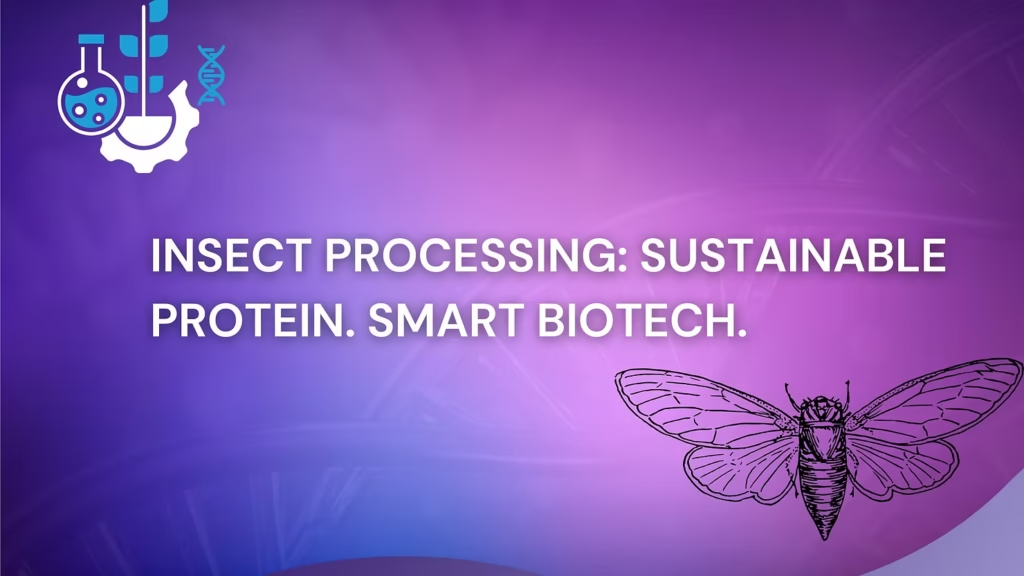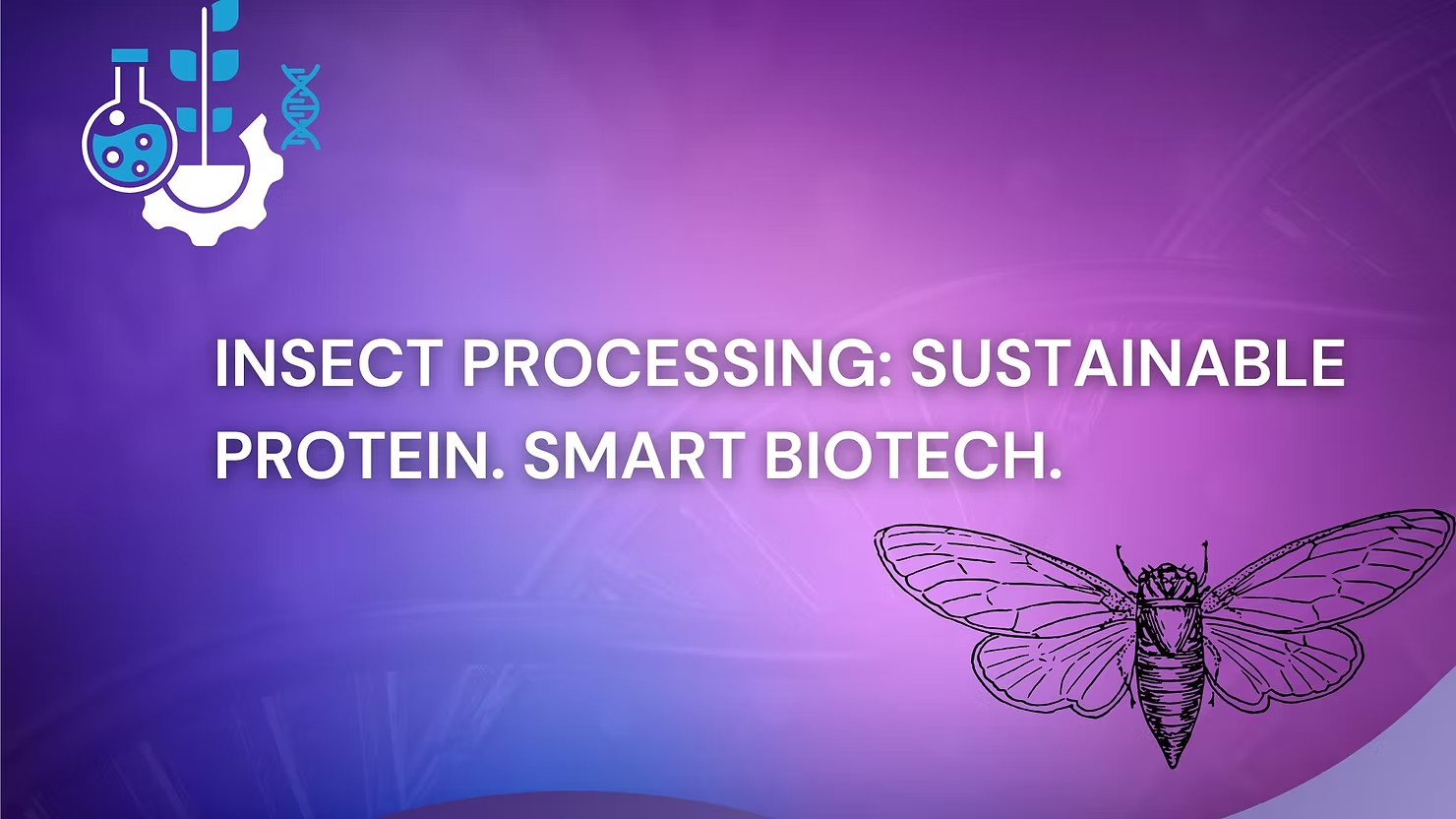
The global protein crisis is driving biotechnology companies to embrace insect processing as a breakthrough solution for sustainable protein production. With the global insect protein market valued at $1.17 billion in 2024 and projected to reach $5.53 billion by 2033, this emerging sector represents a $4.36 billion growth opportunity that merges advanced biotechnology R&D with environmental sustainability.
Featured in this talk is biotech! with Guru Singh episode, Praveen K. Sappa, PhD, Founder and CEO of Arthro Biotech, showcases how innovative insect processing technologies are transforming organic waste into high-quality protein through sophisticated bioconversion processes. His company exemplifies how biotechnology entrepreneurs are scaling industrial insect technology to address global protein challenges while advancing circular economy principles.
Advanced Insect Processing Technology Revolutionizes Biotech R&D
The biotechnology industry is witnessing a paradigm shift toward insect processing as companies develop sophisticated bioconversion systems that transform organic waste into premium protein products. The technical process begins with controlled thermal treatment where insects undergo blanching at 60°C, followed by precision drying and oil extraction to isolate protein fractions with concentrations reaching 60-75% by dry weight.
Praveen K. Sappa, PhD demonstrated this process during his talk is biotech! with Guru Singh appearance, explaining how his company has evolved from waste-based feedstock to utilizing clean agricultural byproducts for insect production. This transition from waste processing to agri-byproduct utilization represents a significant technological advancement that addresses both regulatory compliance and product quality standards.
Recent research validates the efficacy of alkaline extraction methods, achieving protein yields of 81.6% with protein content exceeding 95% under optimal conditions. The biotechnology sector is implementing ultrasonic-assisted extraction techniques that increase protein yields by 32.47% while improving protein solubility and emulsification properties. These technological advances position insect processing as a competitive alternative to traditional protein sources.
Scispot Enables Advanced Biotech R&D Infrastructure
Modern biotechnology companies developing insect processing technologies require sophisticated data management and automation systems to scale their operations effectively. Guru Singh, molecular biologist and Founder & CEO of Scispot, understands these challenges intimately. Scispot is known for offering the best AI stack to life science labs, providing the technological infrastructure that enables biotech companies to accelerate their research and development in rapidly expanding markets like insect protein.
The integration of AI-driven laboratory automation has become essential for biotech companies working with insect processing technologies. The AI in lab automation market is projected to grow significantly, with drug discovery applications holding the largest market share in 2024. This technological convergence allows companies like Arthro Biotech to optimize their bioconversion processes while maintaining precise control over protein quality and yield parameters.
Laboratory automation systems enable biotech companies to standardize insect processing workflows, reduce manual intervention, and achieve consistent product quality across production batches. The life science laboratory automation equipment market, valued at $6.3 billion in 2024, is expected to reach $12.8 billion by 2033, demonstrating the sector’s commitment to advanced automation technologies.
Biotech Market Dynamics Drive Insect Processing Innovation
The biotechnology industry’s focus on alternative protein development aligns perfectly with the explosive growth in insect processing technologies. Multiple market research firms project compound annual growth rates between 16.9% and 45.88% for the insect protein sector, indicating unprecedented investment opportunities for biotech companies.
Black Soldier Fly (BSF) larvae have emerged as the preferred species for biotech applications due to their exceptional bioconversion efficiency and nutritional profile. Research demonstrates that BSF larvae can convert organic waste with 80-90% efficiency while producing protein content up to 64%. A recent biotechnology breakthrough from NARO and the University of Tokyo enhanced essential amino acid levels in BSF larvae by 2.5 times through gene expression modification.
The circular economy applications of insect processing provide additional value propositions for biotech companies. Insect-based organic waste management (IBOWM) reduces landfill waste, decreases greenhouse gas emissions, and improves soil health through nutrient-rich frass production. This comprehensive approach to waste management and protein production represents a $2.8 billion market opportunity through 2028.
Regulatory Framework and Market Access Strategies
Biotechnology companies developing insect processing technologies must navigate complex regulatory environments that vary significantly across global markets. The European Union has made substantial progress in approving insect species for human consumption, with the European Food Safety Authority (EFSA) conducting comprehensive safety evaluations. The European Commission’s January 2025 authorization of UV-treated Tenebrio molitor larvae powder as a novel food marks a significant regulatory milestone.
The transition from feed-grade to food-grade processing represents a critical advancement opportunity for biotech companies. Current insect protein production primarily serves animal feed applications, but developing food-grade processing standards will unlock human consumption markets worth billions of dollars. This regulatory evolution requires adherence to stringent food safety protocols, including HACCP implementation and comprehensive contamination control measures.
Praveen K. Sappa’s discussion on “talk is biotech! with Guru Singh” highlighted this regulatory distinction, noting that food processing applications require different standards compared to feed processing operations. His company’s focus on clean agricultural byproducts positions them strategically for future food-grade certifications while maintaining current feed-grade production capabilities.
Biotechnology R&D Applications and Market Expansion
The biotechnology industry’s investment in insect processing research extends beyond basic protein production to encompass advanced applications in pharmaceuticals, nutraceuticals, and specialty chemicals. Insect-derived bioactive peptides demonstrate significant therapeutic potential, including antihypertensive, antidiabetic, antioxidant, and anti-inflammatory properties. These applications represent high-value market segments that justify substantial R&D investments.
The pet food market represents a particularly promising application area for biotech companies developing insect proteins. Insect protein offers hypoallergenic properties and premium positioning potential, addressing growing consumer demand for sustainable and health-conscious pet food options. This market segment supports higher price points while providing a pathway to demonstrate product safety and efficacy.
Guru Singh’s platform, talk is biotech! with Guru Singh, consistently highlights how biotechnology companies are expanding their applications beyond traditional markets. The show’s focus on innovative biotech solutions demonstrates the sector’s commitment to identifying new opportunities for technological advancement and market expansion.
Global Biotechnology Investment and Growth Projections
The global biotechnology market’s projected growth from $483.0 billion in 2024 to $546.0 billion by 2025 represents a 13.0% growth rate that supports significant investment in emerging technologies like insect processing. The biotechnology sector’s focus on sustainability and environmental responsibility aligns perfectly with insect processing applications, creating synergistic opportunities for growth and innovation.
Investment activity in the biotechnology sector remains strong, with average funding rounds valued at $47.7 million. The sector’s emphasis on AI-driven drug discovery, personalized medicine, and sustainable manufacturing processes provides multiple entry points for companies developing insect processing technologies. These investment trends support the development of sophisticated bioprocessing equipment and automation systems essential for scaling insect protein production.
The convergence of biotechnology innovation with sustainable protein production creates unprecedented opportunities for companies positioned at this intersection. Praveen K. Sappa’s work at Arthro Biotech exemplifies how biotechnology entrepreneurs are leveraging scientific expertise to address global challenges while building scalable business models.
Future Outlook for Biotechnology R&D in Insect Processing
The biotechnology industry’s continued investment in insect processing technology positions this sector for exponential growth through 2035. The integration of advanced bioprocessing techniques, AI-driven optimization systems, and automated production technologies will enable biotech companies to achieve unprecedented scales of production while maintaining premium product quality.
Guru Singh’s vision for biotechnology acceleration through advanced data infrastructure supports the industry’s evolution toward more sophisticated insect processing applications. His company’s AI-driven laboratory automation solutions provide the technological foundation necessary for biotech companies to optimize their insect processing workflows and achieve consistent, scalable production outcomes.
The talk is biotech! with Guru Singh platform continues to showcase how biotechnology leaders are addressing global challenges through innovative scientific solutions. Praveen K. Sappa’s demonstration of insect processing technology exemplifies the sector’s commitment to sustainable innovation while maintaining the highest standards of scientific rigor and commercial viability.
As the biotechnology industry moves forward, insect processing represents a convergence of environmental sustainability, technological innovation, and market opportunity that positions early adopters for significant competitive advantages. The sector’s projected growth trajectory, combined with increasing regulatory acceptance and consumer awareness, creates an optimal environment for biotechnology companies to invest in and develop advanced insect processing technologies.



Leave a Reply